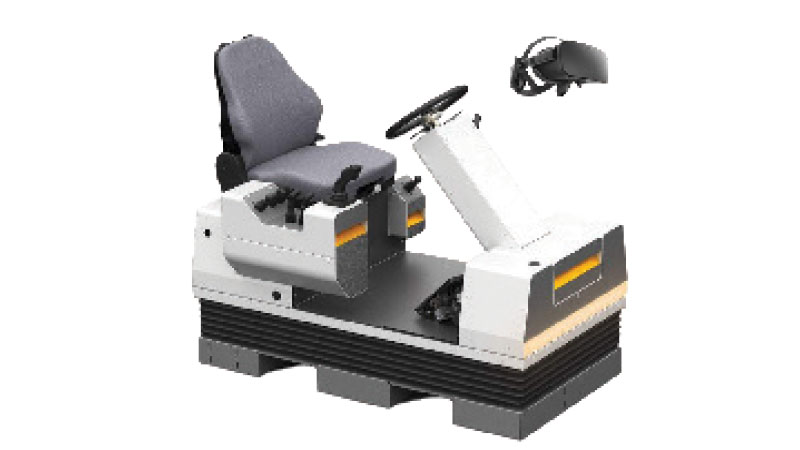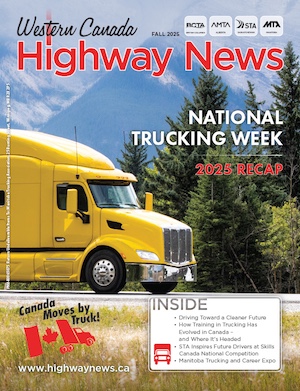One of the biggest developments in the trucking industry is the implementation of the Mandatory Entry-Level Training (MELT) program.
MELT is the new training standard for Class 1 and 2 commercial drivers that will be mandatory for all provinces by 2024. The program is designed to provide entry-level drivers with in-class and on-the-road training to build their skillset and develop their understanding of workplace safety.
Each driver is required to have 100 hours of training, including 76.5 hours of in-cab driving, before they can obtain a license.
Even though MELT increases safety on the road, the program itself has a few flaws. Serious Labs – an award-winning virtual reality technology company located in Edmonton, AB – aims to address some of those issues by introducing virtual reality (VR) training options.
Wade Carson, Senior Product Director at Serious Labs, explained, “While the new MELT requirements are excellent news for increasing safety standards, it means more time as well as greater costs for training centres, more emissions, and makes entering the industry more difficult for new drivers. Our goal is to help alleviate those difficulties and instil best practices for drivers by enabling them to complete part of their in-cab training in VR instead.”
On April 22, 2021, Serious Labs announced that it was developing a virtual reality (VR) commercial truck-driving simulator with support from the Government of Alberta, Emissions Reduction Alberta (ERA), and Alberta Motor Transport Association (AMTA).
VR isn’t a new concept, but it has become more prevalent the past few years. There are three types of simulation – virtual reality (VR), augmented reality (AR), and mixed reality (MR) – but VR is the most immersive. The VR experience occurs through a head-mounted display or a headset and gives the user a sense they are moving amongst virtual objects.
This type of technology first took off in the realm of gaming and evolved as a rising trend in training across other industries, including military, engineering, construction, healthcare and education. The main benefit: VR is a low-risk way to provide students with experience in varying conditions.
VR is also good for knowledge retention when it comes to employees/students. Stanford University and Technical University Denmark found that VR learning methods increased learning effectiveness by 76%. This means that more drivers will better retain what they learned in class and be more prepared when they go for their in-cab training.
Training drivers with VR also addresses the rise in trucking emissions caused by the MELT program. According to Serious Labs, the Canadian trucking industry will contribute more than 5,650,000 tons of greenhouse gases, while drivers are being trained, by 2030.
The Serious Labs’ commercial truck simulator would significantly reduce this number. By 2030, the simulator will reduce 55% of MELT-driven emissions on an annual basis.
Steve MacDonald, CEO of ERA, said, “By replacing in-vehicle training time with VR simulators, Serious Labs has the potential to significantly reduce greenhouse gas emissions from Alberta’s and Canada’s transportation sectors. This technology solution also supports the growth of Alberta’s digital industry, a sector with enormous potential to diversify our economy and help accelerate action on climate change.”
“In addition to the environmental benefits, the simulator will also provide significant advantages for the transportation industry,” said AMTA President Chris Nash. “This VR simulator will change the face of driver training as we know it, and AMTA is behind the innovative technologies that will make our roads safer and our economies stronger. The rapid application of new technology and disruption in industry is advancing quickly and we are proud to work alongside Serious Labs, ERA, and the Government of Alberta. The need for all industries to keep pace with new technology advancements will require collaborative use of data and digitization to develop integrated solutions for a safer tomorrow.”
According to Trucking HR, Canada’s transportation industry is facing a labour shortage of over 20,000 commercial drivers and counting. Although the driver shortage is an ongoing, complex issue, driver training is a part of the overall problem.
Serious Labs, ERA, and the AMTA are excited to work on a program that will help make our roads safer, cut down on emissions, and aid with the driver shortage. With their expertise combined, perhaps VR will be the new normal in education that ushers in a better future with safer highways, fewer emissions, and more accessible training for newcomers to the industry.
References
Marr, Bernard. “The Important Difference Between Virtual Reality, Augmented Reality and Mixed Reality.” Forbes, July 19, 2019.
“Serious Labs Announces Development of Virtual Reality Driving Simulator with Support from Government Partners.” April 22, 2021. Alberta Motor Transport Association. www.amta.ca.
Splinter, Angela. “Understanding Canada’s Truck Driver Shortage.” Web log. TruckingHR Canada (blog), March 1, 2021. www.truckinghr.com.
One of the biggest developments in the trucking industry is the implementation of the Mandatory Entry-Level Training (MELT) program. MELT is the new training standard for Class 1 and 2 commercial drivers that will be mandatory for all provinces by 2024. The program is designed to provide entry-level drivers with in-class and on-the-road training to build their skillset and develop their understanding of workplace safety.


 1-866-985-9791
1-866-985-9791



